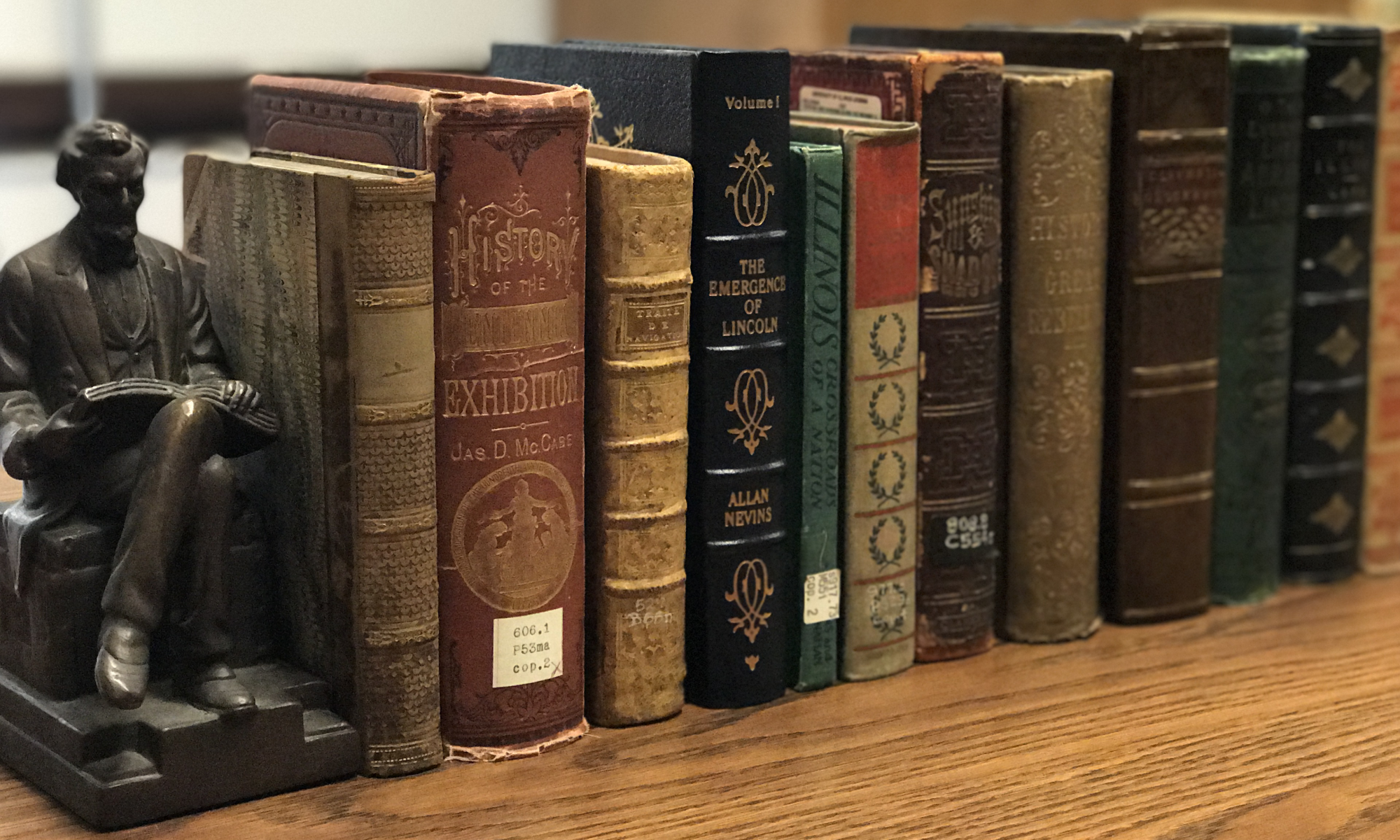Throughout the month of November, we’re focusing on sports in Illinois history. Follow along here and on our social media to learn more about the games, athletes, and teams that have made an impact on Illinois.
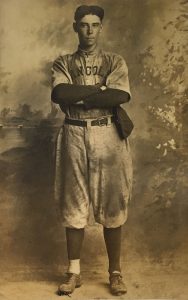
The Arthur E. Sewell Baseball Scrapbook and Photographs consist of a compilation of newspaper clippings along with loose postcards and photographs that document the minor league baseball career of Arthur Sewell during the early twentieth century. A native of Huntley, Illinois, Sewell was born in 1885 and played catcher for several teams between 1909 and 1915.
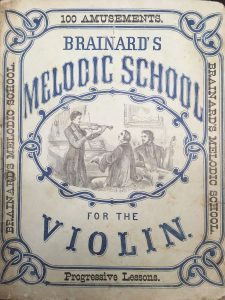
The scrapbook of Sewell’s baseball career is within the pages of a bound music book, Brainard’s Melodic School for the Violin. Newspapers clippings line the pages of sheet music inside. The scrapbook begins with Sewell’s 1909 season with the Galena Speed Boys. Over forty pages of clippings show the rise of Sewell’s baseball career as he gains local, then statewide, acclaim.
One of the highlights of Galena during Sewell’s first season was a game against the Chicago Cubs. The newspaper clipping describes the excitement of the occasion:
Cub day, the biggest day in Galena’s baseball history has come and gone, but the excitement and glory thereof lingers still. The Cubs won – of course they won, but Manager Bales and his men got in two runs that the champs did not count upon, and while the Independents were outclassed no reasoning person could expect otherwise and the locals deserve no little share of credit for playing the game they did.
The paper goes on to note that even if the score had been “twenty to nothing instead of six to two, it would have placed no discount on the fact that Galena got the Cubs to play here, and it would have placed no discount on the work of the Galena team.” The season ended with 49 games won, 16 lost and one tied. Throughout, Sewell is noted in the clippings for preventing opponents from scoring at home and making strong hits that helped Galena score.
In the 1910 season Sewell played for the Lincoln Abes of Lincoln, Illinois in the Class D Illinois-Missouri League. Much to the excitement of the local papers, at the end of the season Sewell was drafted by the Chicago Cubs. On September 1 the papers announced that the Cubs were signing eleven minor leaguers, including Sewell and one other Lincoln player named Wolfe. A newspaper clipping noted their success and the town’s pride:
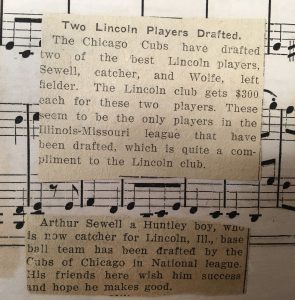
One article reviewed the Cubs’ selection and stated, “In the selection of catchers, Sewell is unquestionably the best backstop in the league, both in the catching and batting departments.” Another local paper congratulated Sewell further, writing “We will not likely see Wolfe and Sewell in action again unless we visit a higher class league. Bad as we hate to see them leave us, we are glad of their promotion and hope they will be classes with Cobb and Kling in the not distant future.”
Unfortunately, the excitement and hope for Sewell’s career with the Cubs was cut short. Sewell was released by the Chicago National League Club shortly after he was drafted. His release was necessary to make room for pitcher Victor Willis, coming from the Cardinals. The Cubs’ manager had made a full list of players before Willis was signed on, so when Willis was signed as an important addition, one of the players that was originally drafted had to be let go in order stay within the national commission’s thirty-five man limit.
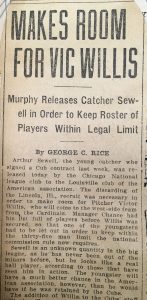
Following this unexpected obstacle, Sewell joined the Lexington Club of the Blue Grass League in 1911. That very year, however, the National Board of Arbitration of the National Association of Baseball League gave notice that for the first time in the history of minor league baseball it was expelling an entire league from the National association. The Blue Grass League, which included Lexington, was barred for the league’s plans to violate a territorial agreement. With that, Sewell was on his way once again, this time back to Illinois. From 1913 to 1914 Sewell played for the Rockford Wolves in the Wisconsin-Illinois League, and the scrapbook concludes in 1915 with Sewell’s season for a Freeport team.
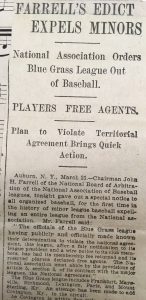
Although Sewell’s major league aspirations were impeded, his success in the minor leagues in Illinois is clear. The scrapbook’s newspaper clippings indicate his value as both a catcher and a batter, and he is frequently touted as a key player and all-star contender. While professional baseball got its start in the 19th century, it developed strong roots in the early 1900s. The number of leagues more than doubled from 1901 to 1910. Many of these small regional leagues fell apart with World War I, and the numbers continued to fluctuate around World War II. The leagues were further affected by the widespread proliferation of television. Sewell’s career marks a time in minor league baseball characterized by stability and local pride and engagement. This scrapbook offers a unique look at an era of major growth and support for the minor league through a local lens that encapsulates the spirit of the game. You can learn more about Sewell’s baseball career in the IHLC’s Arthur E. Sewell Baseball Scrapbook and Photographs, 1909-1915 (MS 827).
Other Resources
Land, Kenneth C., Walter R. Davis, and Judith R. Blau. 1994. “Organizing the Boys of Summer: The Evolution of U.S. Minor-League Baseball, 1883-1990.” American Journal of Sociology 100 (3): 781. doi:10.1086/230581.
“Midwest Sport in the Twentieth and Twenty First Centuries.” In The Greenwood Encyclopedia of American Regional Cultures: The Midwest, edited by Joseph W. Slade, and Judith Yaross Lee. ABC-CLIO, 2004. http://proxy2.library.illinois.edu/login?url=https://search.credoreference.com/content/entry/abcarcmw/midwest_sport_in_the_twentieth_and_twenty_first_centuries/0?institutionId=386
